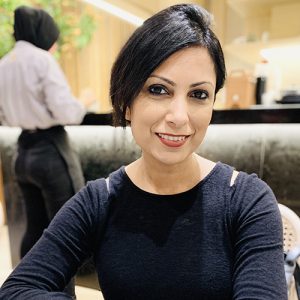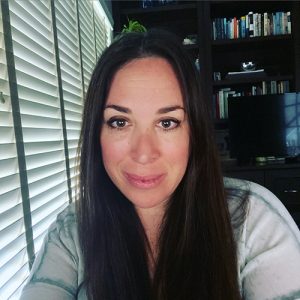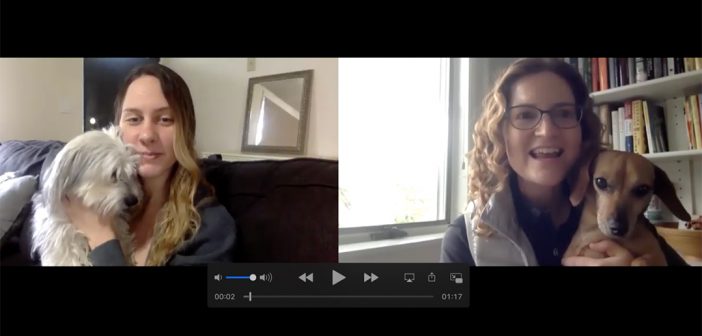“The COVID-19 pandemic has stretched the GSS community in unprecedented ways,” said Debra M. McPhee, Ph.D., dean of the Graduate School of Social Service. “Very quickly, the school faced new and complex challenges in both logistics and communication. Yet the whole team, including faculty, pulled together to develop the means and opportunity for GSS students to continue remotely with both their studies and their fieldwork.”
Ensuring the health and safety of students has been the school’s and the University’s highest priority, McPhee said. Due to the requirements of New York on Pause, on March 12, GSS had to temporarily suspend all MSW field placements. The school was able to quickly adjust their standing field guidelines to align with the COVID-19 revised standards issued by the accrediting body, the Council of Social Work Education (CSWE), and the New York State Department of Education. The temporary revisions were designed to help minimize disruption to student’s academic progress.
Some community agencies were able to adjust and switch to offering virtual services to their clients. Many were able to retain their MSW student interns and equip them to continue their placement work remotely; however, many were not. As a result, GSS immediately secured, and even developed, new remote field opportunities for those students who were unable to continue with their initial placement agency.
As GSS pivoted toward remote care, news began to reach them that alumni were falling ill and several alumni had died on the front lines, underscoring the gravity of the situation. Underserved communities that the school has served for generations were being disproportionately affected. Students worked hard to attend to the needs of the community while attending to their own families’ needs.
While not necessarily on the front lines, three students from GSS at Fordham’s Westchester campus were confronted with lessons they never expected to learn. They recently spoke with Fordham News about how COVID-19 upended their lives, but not their education.
Caring for Older Adults in Westchester and Bangladesh

Sadia Huq
During the day, GSS student Sadia Huq is still working on the phone checking in on her older clients through Westchester Community Services. She is in her first year of the two-year master’s program. At night, she’s on the phone talking to doctors in Bangladesh, managing the care for her father who is sick with COVID-19.
“It’s hard for me to separate that from my work, put my emotions on the side, going through the whole emotional trauma of it all from 8 p.m. to 8 a.m. on the phone with Bangladesh,” said Huq. “I’m at the placement and functional during the day, but it feels like I’m living two different lives.”
GSS students must complete two field practicums: a generalist placement, which exposes students to foundational social work practice, and an advanced placement in their second year. In the generalist placement, students develop core practice skills across a range of settings with individuals, families, groups, organizations, and communities. In the advanced year, students have an opportunity to develop practice competence in a preferred area of practice. Huq just completed her generalist placement. Like all field placements, Huq has two supervisors, one from Fordham and another at the assigned community agency. She said that they reviewed her client work every week and provided “exceptional support.”
The placement began in September of last year with her visiting six clients in their homes and at nursing homes. She was skeptical of working in geriatrics, but she came to appreciate the generalist placement because it helped her adapt to multiple clients and client needs.
“The clients were mostly isolated and while the phone not very personal, it was very helpful,” she said. “They were able to tell me what they were dealing with emotionally; it was important for them to just vent. None of them had smartphones and it was basically landline.”
She said that in addition to counseling, she was also able to gauge the needs of the clients. Some had lost home care aids during the crisis. She worked with the agency in replacing them.
She became inspired by the resilience of her older clients, two of whom were blind. Part of her effort over the phone was to get the patient to get up and walk around. She was familiar with their homes and she guided them as best she could to complete basic tasks that they could do before quarantine, like getting a glass of water in the kitchen. She said she will always remember such simple accomplishments for the rest of her life.
“I was the only point of contact for some of them,” she said. “Even a twenty-minute phone call helps lessen the isolation.”
Her classwork helped navigate a variety of issues, but a lot of things one learns in books don’t fully prepare you for practice, she said.
“Some are just waiting for you to walk in that door,” she said “I was able to apply the professional boundaries, but I had to struggle when they say things like ‘You’re like my family member’ and ‘I love you.’”
Huq said she was very happy working with Westchester Community Services, and her second placement will be to continue working with the agency, this time with children ages 4 to 16. Her father is still in the hospital.
Shifting from Group Dynamics to Individual Care … and Back Again

Michele Kalt
For Michele Kalt, GSS ’20, the last school year’s placement was very different from her first year at Saint Vincent’s Hospital in Westchester, where she worked with adult psychiatric patients. This year, she worked with the Larchmont Mamaroneck Community Counseling Center as a group facilitator and individual counselor for middle school students. The unique program seeks to provide students with tools to make good decisions. Kalt met her students in September. She worked with students from a variety of socioeconomic backgrounds and delved deep into difficult subjects.
“One of the goals of the group is to bridge those gaps and expose the children to other experiences, and it happens in a very organic way; some groups can be goofier and others keep their feelings at the surface,” said Kalt. “I’m there to facilitate, but the group usually takes over; a lot of the real the good work was just starting to happen when the pandemic hit.”
Unfortunately, the group work had to be terminated immediately.
“It was disheartening not to be able to do a proper termination, which is something we learn the importance of in class,” she said.
Although Westchester was the initial “hot spot” of the crisis in the U.S., Kalt managed to continue working with her individual clients.
Since all her young clients were digital natives, the transition to remote care was surprisingly simple, she said. She added that moving from an adult psychiatric hospital to working with middle school students had already helped her learn how to quickly adapt.
“Social work careers are all very different, so that adaptability of moving from Saint Vincent’s gave me a takeaway that you’re not going to recreate the same experience at every place you work,” she said. “In this situation where the whole world had to adapt, that’s something I already learned to do.”
Still, she said she misses the camaraderie of being able to process a situation on the spot with team members on staff. She appreciates the weekly group clinical supervision meetings held on Zoom, as well as the one-on-one phone calls with her supervisor. She will finish the placement at the end of the school year this June.
“Some of these kids struggle with groups in the school environment, so the pause was somewhat of a relief for them,” she said. “That also means you need to check on your extroverted kids. For now, the [introverted]kids have a reprieve, but as it goes on longer we’ll still need to address why they like being at home.
Animals to the Rescue
Holly Moskow did her placement with Green Chimneys Residential Treatment Center. The school sits on acres of farmland and caters to children who might not otherwise thrive in a typical school environment. There are children on the autism spectrum as well as children who have trouble regulating their emotions. But in addition to schoolwork, students get individual therapy that includes plenty of interaction with farm animals living on campus.
“In the experiential model it was very different, I might go and get a dog for the student to interact with or we could just walk around the campus,” said Moskow, who graduated this past semester. “Animals helped lessen the pressure. For a student who may not feel a sense of confidence, I’d ask him to show me his expertise on how to handle a dog.”
Once the pandemic hit, Moskow could not return to the campus and she began remote care from her home. Some of Green Chimney’s staff remained on campus. Staff created Zoom meetings that included visits with some of the children’s favorite animals. Videos were made of the horses so that social workers could play them back for clients.
Indeed, there was a shift in care. As with most families dealing with the pandemic, parent involvement played a key role.
“A lot of what we do involves supporting parents. At home that became a larger part, so every weekend I’d check in with the parents to provide them with as many tools as I could,” she said. “It became a lot for families to reset some expectations and goals, and reprioritize.”
Moskow said one of the reasons she wanted to be a social worker was for the one-on-one contact, but now she was tethered to her computer.
“That was really a void, not only missing the connection with the clients but with my colleagues; it definitely was a letdown in terms of the work I was doing, but at the same time I was very eager to continue the relationships,” she said. “I wanted to know how does this [technology]work and how can I make it so that it will help me after graduating.”
Moskow said the remote experience has played well in job interviews with social service agencies still coping with an uncertain future.
As usual, there’s always an end to field placements. Moskow had to say goodbye to her clients and introduce the student to their new social worker. Fortunately, both had assistance from their canines.
“I had my dog on the screen and she had hers,” she said. “In the end, I was really interested in the remote experience, as well as the animal therapy. I thought it was great.”
Dean McPhee said she’s grateful to all the dedicated members of the GSS community who have stepped up and worked tirelessly over the past few months, and very proud of the care and commitment the GSS students have demonstrated during this time of crisis.
“Although they’re still students,” she said, “they have exhibited skill and a level of social work professionalism that is a tribute to GSS and that the world needs now more than ever.”



